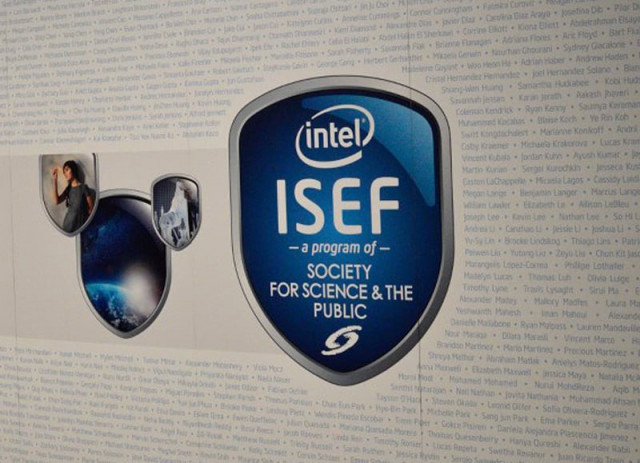Young Einsteins: Pakistani students tackle national problems at Isef
Teenagers display their much lauded projects on an international platform.

The Intel International Science and Engineering Fair (Isef) was held in the American city of Phoenix, from May 12 to May 17. PHOTO: facebook.com/societyforscience
Seventeen-year-old Muhammad Ahsan Nawaz isn’t one to let a few hurdles slow him down.
He struggled with school, dropped out for four years, and still made it to the list of finalists at the world’s largest pre-college science competition.
Nawaz was one of 10 Pakistani students selected for the Intel International Science and Engineering Fair (Isef), held in the American city of Phoenix, from May 12 to May 17. Isef brings together the research of 1,600 teenage scientists from 70 countries, territories and regions across the world.
Although the Pakistani students did not manage to win any awards, they did come up with energy-smart solutions for many of the country’s critical problems. Amongst others, these include doubling the efficiency of solar panels and using fruit skin to clean industrial waste.
Like many of his peers, this was Ahsan’s first trip abroad. And yet, despite language barriers, nothing held him back as he interacted with young researchers from across the globe and passionately shared his research.

The making of the man
Today, Ahsan has made mobile phone SIMs that can be used as security sensors and can control other devices, such as power grid stations. “You won’t need control rooms at grid stations anymore and the best thing is, it works free of charge!” he says excitedly.
Ashan studied in a government high school in Mailsi, District Vehari, but he found in Arizona what he couldn’t find in his classroom: understanding. “My teachers would never understand what I was trying to say or the questions I asked so I was never any good at academics.”
Right after the eighth grade, Ahsan dropped out of school four years.
“[My brother] got cancer and was being treated at Patel Hospital in Karachi. To help with the medical expenses, I got a job at a cell phone store nearby,” relates the teenager, one of six siblings – five brothers and a sister. “The treatment cost us everything and we eventually had to sell our house and move back to Mailsi.”
He pauses for a while. “Do you know where Mailsi is?” he asks, before continuing. “When some aid organisations helped with the treatment, I could go back to school.”
In hindsight, it seems that the job at the cell phone store helped nurture his primary passion for science. “I have been interested in electronics since I was a child, and [this was facilitated by] work at [the] electronics shop,” he says.
Passionate projects and pursuits
The potential for his project was spotted by an Intel focal person, who he refers to as Sir Faheem, at a district science fair in his hometown. Faheem insisted that he submit his research to the international competition in the US.
“I didn’t want to go ahead with this project because I wasn’t satisfied with it, but there wasn’t enough time to submit another research,” Ahsan says modestly.
Just hours after the names of the winners were announced, Ahsan has already thought of a Plan B. “I am going to work on this a little more, make this device control other machines, too, and compete at Isef again next year,” he says.
Ahsan is also planning to create a mobile phone battery which charges 30% of the battery as one speaks. “The longer you talk, the more it will charge,” he explains.
Ahsan is well aware of the power of the device in his hands. He knows his creation can be dangerous. “I know this can be used for wrong means,” he says. “But I have made sure it can’t be used to detonate a bomb.”
Published in The Express Tribune, June 1st, 2013.

1724319076-0/Untitled-design-(5)1724319076-0-208x130.webp)

















COMMENTS
Comments are moderated and generally will be posted if they are on-topic and not abusive.
For more information, please see our Comments FAQ